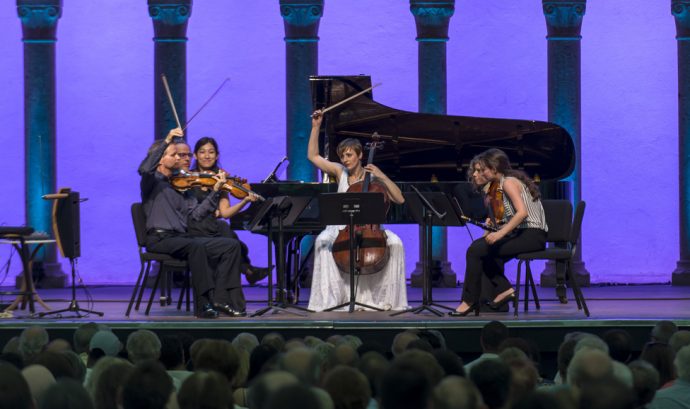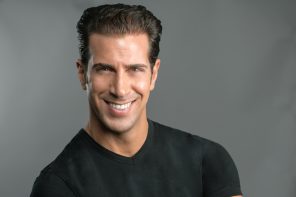Written by Gregg Shapiro
As residents and visitors to the area can attest, there is no shortage of cultural attractions in Westchester County. However, few have the distinction of Copland House in Cortlandt Manor.
The late composer Aaron Copland — whose folk-flavored melodies and open chords would define the sweeping American landscape in works like “Appalachian Spring,” “Billy the Kid,” “Fanfare for the Common Man, “Rodeo” and the Oscar-winning score of “The Heiress” — was, ironically, a product of the East, like so many artists who came to define the American West, New Rochelle sculptor Frederic Remington and novelist Zane Grey among them.
Copland was a Brooklynite who spent many years in bucolic Cortlandt Manor, purchasing his home, Rock Hill, in 1960. He lived and created there until his death in 1990 at age 90.
Now an historic landmark, Copland House has been a creative center of American music for almost 20 years, offering residencies, commissions for composers and scholarships. It is also renowned for concerts performed by the resident ensemble, Music From Copland House, under the guidance of artistic and executive director Michael Boriskin. (Another aspect of Copland House is the performance and collaborative residency space Copland House at Merestead in Armonk, a private-public partnership with Westchester that began in 2009.)
Recently, WAG spoke with Boriskin about Copland House, as well as “Secret Alchemy: Chamber Works by Pierre Jalbert,” the 2017 CD by Music from Copland House:
Michael, as an accomplished musician, what did it mean to you to be named artistic director of Copland House in 1998 and executive director in 2003?
“Being involved with this undertaking, which started as a genuine grassroots movement to preserve Aaron Copland’s longtime home in Westchester, was, in a lot of ways, an opportunity of a lifetime, to be able to build something in Aaron Copland’s name right here in Westchester. At the very beginning of what’s become a long and exhilarating journey, most of us had very little idea about how big and far-flung this would eventually become.”
What is involved in your duties as artistic and executive director?
“I’ve often said that that dual title means that I not only have to raise money for this organization, but I get to spend it, too [laughs]. Basically, my position is as the CEO of the organization, which means that I oversee everything that happens at the organization both artistically and institutionally.”
Does the responsibility of coming up with a wealth of ideas for projects and events fall to you alone or are you able to work as part of a team?
“I am part of a team. We have an extraordinary roster of international artists that we work with, between our composers and our performers. All of us have loads of ideas. Part of the vast potential of our artistic activities rests on the fact that American concert music is still sort of marginalized and is largely underexplored, if not unexplored. That really gives us the possibility of creating programs that are very different from the norm. We’ve often said that we’ve got 20 years of programming ideas without breaking a sweat.”
Copland has a long history with Westchester County.
“You’re right, Copland did spend more than half of his life in Westchester. He loved being able to get out into the countryside as a more serene and congenial place to do his creative work.”
Did you ever have a chance to meet Copland?
“Yes, I did have the privilege and the pleasure of meeting him two or three times late in his life. It was, as you can imagine, a real treat.”
Copland House is the only national historic landmark in the country directly linked to someone from the realm of classical music. What do you think that means to the residents of Westchester County?
“For that reason, and many others, Copland House is a real cultural, historical and civic asset to the county. It points to the fact that we have a number of truly iconic figures, not only in the arts but in other fields, that have been attracted to this place. Certainly, Copland House’s public activities have drawn large numbers of people from throughout the region and around the country to come here. It brings value to the county in that sense. The artists that have come to be in residence at Copland House come from all over the country. Copland House itself has served as an on-air media location for broadcast and television stations and networks from all over the world. We really feel it is, on many levels, (important) for attracting people to Westchester and view it as an important part of the landscape of the county.”
The new Music from Copland House CD “Secret Alchemy: Chamber Works by Pierre Jalbert” was recorded between 2013 and 2015. What can you tell me about the process and why it took almost two years?
“Actually, compared to pop or rock recordings, two years could be a very short time. It was a combination of logistical reasons in terms of planning and scheduling when individual works for a particular recording project are going to be (recorded).”
In the liner notes that you wrote for “Secret Alchemy,” you include a quote from The New Yorker about Jalbert that describes him as “an acknowledged chamber-music master.” What is it about Jalbert that makes him so?
“He really looks at chamber music like an animated, exciting and intelligent conversation amongst a small group of people who happen to be playing instruments instead of speaking. His music is multilayered, dynamic and really urgent. There’s a kind of clarity and focus to his work that maybe best manifests itself in working with smaller ensembles.”
Also in the liner notes for “Secret Alchemy,” there is a quote attributed to Jalbert in which he makes mention of having listened to “a lot” of Copland while he was growing up. Was that an important factor when it came to working with him?
“I wouldn’t say that that was. It was obviously an important factor for him as he developed as a young artist. For us, what was really most important was the dynamism and high quality of his music. Ultimately, that’s where we stand or fall — on the level of the music that we present.”
Finally, Michael, is there a style of music that you listen to for your own enjoyment that might come as a surprise to the readers and fans of Music from Copland House?
“I’ve given up on what surprises anybody these days [laughs]. I listen pretty widely, actually. I listen to lots of jazz. I listen to some pop and rock music, but probably of a somewhat earlier generation. At the moment, like so many people are, I’m fascinated with ‘Hamilton’ but from a musical point of view. I’m just getting acquainted with the score of Hamilton. The story’s great, but as a musician, I’m totally intrigued and fascinated by Lin-Manuel Miranda’s musical palette.”




